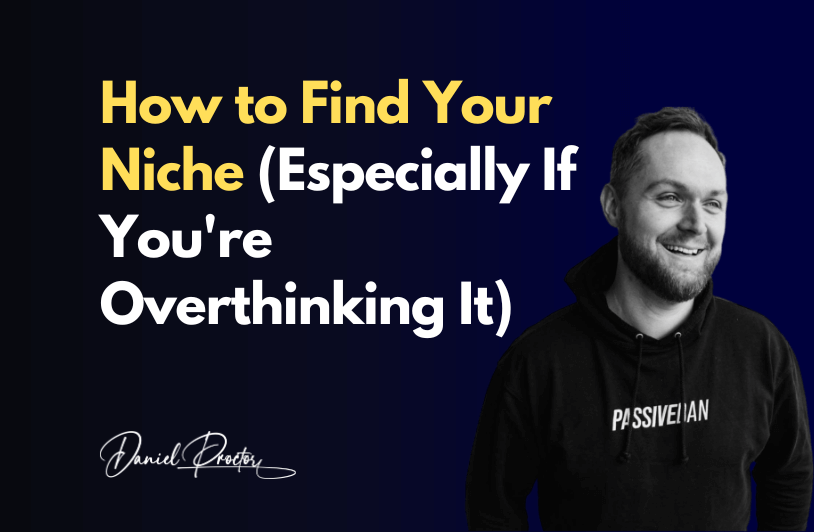Let me guess—you want to start something online. Maybe it’s affiliate marketing. Maybe it’s coaching. Maybe you’re just tired of thinking about it and ready to finally go for it.
But then comes that dreaded question:
“What’s your niche?”
Ugh.
Even after 10 years in this space—mentoring people from all walks of life, across every timezone you can think of—I still see this trip people up more than almost anything else. It feels like the first big hurdle. And somehow, the scariest.
So if you’re spinning your wheels on this, you’re not alone. Let’s take the pressure off and look at it in a way that actually makes sense.
What Is a Niche, Anyway? (Really)
In simple terms, your niche is just the specific space you show up in. It’s who you help, what you help them with, and ideally, why they should listen to you.
But here’s where it gets messy:
People assume they need to find this ultra-specific, never-done-before golden topic before they start. Something that magically balances passion, profit, and uniqueness in one neat little package.
Spoiler: that’s not how it works.
In fact, I’ve watched students obsess over this step for months—and it holds them back way more than choosing “wrong” ever would.
Your Niche Doesn’t Have to Be Forever
This is a big one, and I wish more people heard it earlier:
Your first niche is allowed to be temporary.
You’re not signing a lifelong contract. You’re simply choosing a starting point. The niche you pick today might evolve 6 months from now. Heck, I’ve seen students completely change direction a year in—and grow faster because of it.
You learn so much by doing. Not just reading. Not just researching. Doing.
So if you’re waiting to be 100% sure, maybe don’t. Be 70% sure. That’s usually enough to start.
How I Help Students Find Their Niche (and What Actually Works)
I’ve coached students across five continents, and while their goals and backgrounds vary wildly, the process of finding a niche usually comes down to three simple areas:
1. Interest or Experience
Ask yourself:
- What do I enjoy talking about?
- What have I figured out that others still struggle with?
- What would I actually enjoy creating content around for the next 90 days?
Does it have to be your life’s passion? No.
But some curiosity or real-world context helps a ton.
2. Market Need
A niche isn’t just what you care about—it’s where your interest meets someone else’s problem.
Scroll Reddit, Facebook groups, Amazon reviews. Look for rants, pain points, confusion. That’s your opportunity. You’re not just sharing knowledge; you’re solving something specific.
3. Money Potential
Let’s be honest—most people I mentor aren’t building online businesses for fun. You want this to make money.
So yes, your niche should have buying power. It doesn’t need to be massive. But it does need to support offers—affiliate products, courses, services, etc.
Here’s the good news: almost any niche can be monetized if you focus on helping a specific person overcome a clear problem.
Real Talk: You Don’t Need to Be an Expert
One of the biggest lies in online business is “you have to be the expert to teach/sell/promote anything.”
Not true.
You just need to be a few steps ahead of your audience. I’ve seen beginners start documenting their journey—and that alone became their niche. People love realness. Honesty. Someone figuring it out in public.
So don’t wait until you feel qualified. That feeling might never come. Start with what you do know. You’ll learn the rest as you go.
A Few Questions I Ask My Students
If you’re still stuck, try these:
- What would I Google at 2am if I was struggling with something?
- What’s a problem I’ve already solved in my own life?
- What topic do people in my circle ask me about without even thinking?
Your answers won’t give you the final destination. But they’ll point you in the right direction.
Final Thought: Start Small. Start Messy. Just Start.
Honestly? Most people overcomplicate this. They wait for clarity. For signs. For a niche to appear with neon lights and a guaranteed ROI.
But what I’ve learned—through building my own affiliate business, and helping hundreds of students build theirs—is this:
Clarity comes from action.
You don’t figure it all out first. You start, and then you figure it out along the way.
So take a step. Pick a niche that feels “good enough.” Talk to people. Create something. Get feedback. Tweak. Repeat.
Your niche isn’t a fixed identity. It’s a direction. And you can always change direction later.
👉 Want some help picking tools for your niche?
Once you’ve got a niche idea (or even a rough draft), the next step is getting the right tools to actually start building. I’ve put together a resource page with my go-to affiliate marketing tools—stuff I’ve used myself and recommended to students around the world.
Also, if you’re just getting started, grab my Free Masterclass—it’s a completely free guide that walks you through the foundations of launching your first profitable affiliate marketing funnel. No fluff, just the essentials to get moving.

